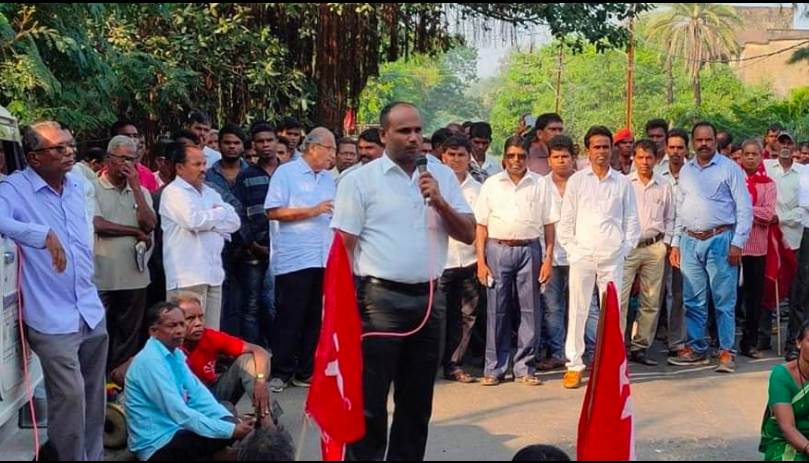Maha Crisis: Lone MLA Not Herded Into a Hotel

Vinod Nikole, MLA-Dahanu
Maharashtra’s interim government formed on a fateful Saturday night five days ago, has ceased to exist. The top two involved in the shenanigans, Devendra Fadnavis and Ajit Pawar, have submitted their resignations. Now the stage is set for a non-Bharatiya Janata Party government. Here are the lessons the BJP and its friends have learned from this month-long drama full of intrigue and twists.
First, on Constitution Day, the Supreme Court stood by constitutional values and decided to order a floor test quickly—that too via open ballot, and on camera, to ensure complete transparency. As the court decided this, Fadnavis and his deputy the rebel Nationalist Congress Party (NCP) leader Ajit Pawar accepted the natural outcome of their ill-conceived move. Citizens can have some hope on the role of the judiciary.
Second, this theatre of the absurd, should sober up the cast of villains on all sides that participated in it. The Shiv Sena fought the polls as a junior partner of the BJP, but after the elections, it wanted a 50-50 share of power “as discussed earlier”. The NCP took the lead to form government with the Sena, but it wavered when the Congress party did not provide a letter of support to it. The Congress was initially non-committal and now, after pressures from their state unit, the high command has yielded to a Sena-led government. And the BJP formed a farcical government, secretively, at the crack of dawn with the Prime Minister using his extraordinary powers to revoke President’s rule that had been imposed on Maharashtra.
The third aspect is the gubernatorial bias: I have written before on the irrelevance of a post akin to the British Raj-like governor in the 21st century. This irrelevance has once again come to the fore. In spite of the Constitution clearly noting that the governor must assure himself that those claiming the capacity to form government actually have the numbers with them, the governor—a former BJP minister at the Centre—yielded to pressure or became party to the drama that made a mockery of his constitutional position.
Serious questions arise on the predatory and biased role of the governors and their political misuse, right from the times of former Prime Minister Indira Gandhi. The country needs to rethink the role and purpose of governors and whether this position serves a useful purpose. However, only a multi-party government at the Centre, in which no one party has an overwhelming majority, nor one person holds untrammeled power, should initiate an amendment in this respect.
Fourth, we learn that political parties lack ideological moorings and convictions today. Ideology is almost history. The Sena lost its Hindutva outlook and tied up with the Congress; the NCP and Congress lost their anti-communal plank in tying up with the Sena, and the BJP loses its anti-corruption rhetoric when it tied up with someone they had called the “fountainhead of corruption”, Ajit Pawar.
Hence, the lesson we learn is that an era of adjustments, compromises, and Common Minimum Programs (focusing on welfare and governance) are the flavour of this moment.
Five, the BJP’s longtime claim of being unblemished and free from corruption stands busted once again. The Prime Minister used his extraordinary powers to revoke President’s Rule in Maharashtra without holding a cabinet meeting. It was ratified by the President at 5 AM, and was put in to action by Maharashtra’s governor. The oath ceremony took place just before 8 AM, and Fadnavis was inducted as chief minister, while Pawar was declared deputy CM—the same Pawar against whom Fadnavis government has been carrying on a investigation into corruption to the tune of Rs 70,000 crore. Not just that: the Anti-Corruption Bureau, within two days of Pawar taking charge, even announced that nine major charges would not stick against Pawar.
The entire affair stinks of corruption. This is apart from the issue of BJP allegedly buying legislators’ support in Karnataka, Goa, Manipur and elsewhere.
Six, resort and hotel politics has come to stay. After every election, wherever there is no clear or a wafer-thin majority, the issue of ‘safeguarding’ Opposition Members of Legislative Assembly (MLAs) has come to occupy centre-stage in the media and public mind. Various parties hoard their legislators in different hotels, within or beyond their states, and this has become a permanent feature as seen in Goa, Karnataka and now Maharashtra. Such things did happen in the past, but rarely. In the Modi-Shah era, it occurs with alarming regularity, making a mockery of politics and the people’s mandate.
Seventh, India has an anti-defection law by which if a group of legislators wish to break-away from their party, they have to be one-third or more of the total elected members of that party in that House (central or state). So, while retail defection is prevented, wholesale is allowed. The time has come to disallow any defection by any elected member. One can resign, or a party can decide in totality to align with another or move away from an alliance. But individual legislators, whether one or few or many, on their own, should not be allowed to defect.
Eight, there is also a lesson for the media. Unfortunately the larger section of Indian media has become lapdog of the ruling party and called this midnight misadventure a “masterstroke”, a much-used word in recent times. Also, ‘Chanakya-Neeti’ has been used for blatant use of investigative agencies like Enforcement Directorate (ED) and Central Bureau of Investigation (CBI) and glaring offers and buying-out of support of MLAs. Media needs to be the watchdog and must resolutely stand to question those in power, whoever they may be, in whichever government. In spite of obvious irregularities in this case, media rather lauded the “speed” at which a government was stealthily installed.
Nine: the Opposition can learn the lesson of working unitedly, with a Common Minimum Program. They need to formulate a different strategy for each state, if they are keen to strongly rebut what it calls “anti-people measures and economic failures” of the government led by PM Narendra Modi’s government. A pro-people role in the Opposition-led state governments will set an example for people to consider voting and supporting. The absence of a viable and resolute Opposition shall only push India to one-party autocracy, for which the Opposition will be as responsible as the ruling party. The Opposition rebuttal in Maharashtra must not be wasted—it must inject some spirit in the Opposition camp.
Ten, it is interesting to note that the poorest MLA in Maharashtra was the only legislator who was not contacted by anyone to be bought or sold. He was and still is not open to horse-trading. He did not appear in any hotel. And he was silently working for his constituency even after the election results were announced. He is Vinod Nikole, the Communist Party of India-Marxist or CPM MLA from Dahanu, who has declared assets of only Rs 52,000, the least among all MLAs. The lesson for parties is that one does not need billions to serve the hungry millions selflessly. It needs intention—a firm one.
The author is Pro Vice Chancellor of Adamas University in Kolkata.
Get the latest reports & analysis with people's perspective on Protests, movements & deep analytical videos, discussions of the current affairs in your Telegram app. Subscribe to NewsClick's Telegram channel & get Real-Time updates on stories, as they get published on our website.
























